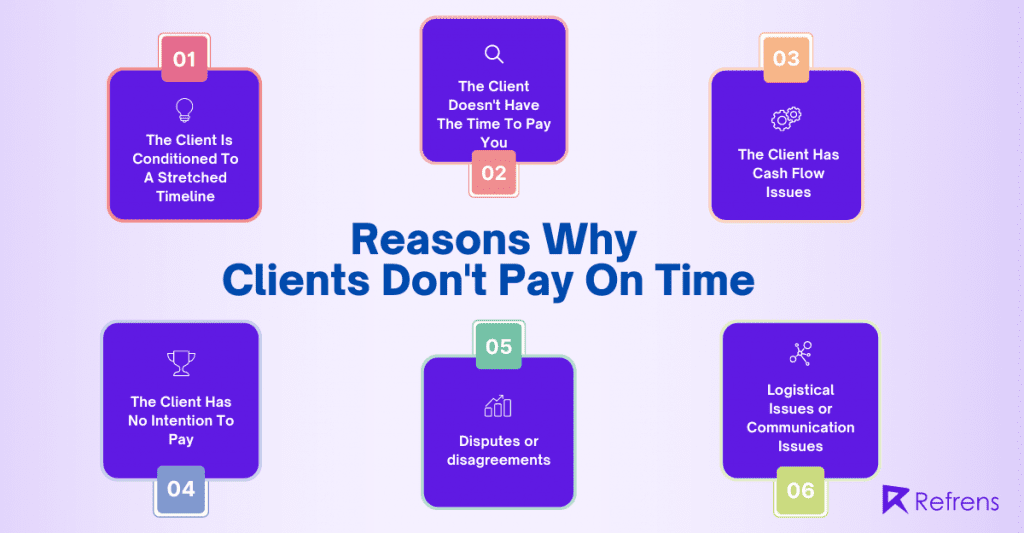As a freelancer or small business owner, one of the most frustrating experiences can be clients not paying on time. Late payments can cause cash flow problems and put a strain on your business, and it can be challenging to know why clients are not paying as agreed.
However, by understanding the common reasons why clients don’t pay on time, you can take steps to reduce the risk of late payments and better manage your finances.
Let us give a walk-through of the six reasons we have listed from our first-hand experience.
Reasons Why Clients Don’t Pay On Time And How To Deal With It

1. The Client Is Conditioned To A Stretched Timeline
The client has a habit of prolonging the payment schedule to the fullest extent possible. As a result, they lack a sense of urgency when making payments and believe that by delaying payment, they can enhance their own cash flow.
How to deal with this issue?
Dealing with such clients requires the use of incentives as a solution. In large B2B businesses, there is usually a provision for payment terms or penalties in case of delays or benefits for early payments.
Taking inspiration from here, you can adapt to a similar practice. You can offer anywhere between 2 to 5% discount if the client pays on time.
Implementing penalties may not be effective for a smaller business. Still, offering incentives for timely payment, such as discounts, creates a sense of urgency for the client to pay on time and can benefit the business.
2. The Client Doesn’t Have The Time To Pay You
You are not a priority to them. They don’t intend to postpone the payment, but they need to resolve certain matters before making the payment to you.
How to deal with this issue?
Simplify the payment process for clients by providing them with an email they can forward to their financial department. If you are communicating via WhatsApp, ensure the payment details are listed.
Providing the capability for clients to delegate the work can minimize the probability of delays and alleviate the back-and-forth inconvenience.
3. The Client Has Cash Flow Issues
Late payments from clients can often be attributed to cash flow issues, whether due to their clients paying late or to loan requirements mandating a certain amount in the account. However, this could also be because they overestimated their growth while hiring you, and it didn’t pan out as they imagined.
To reduce the risk of this happening, try to work with clients with a good track record of paying on time and be open to negotiating payment terms if you know that a client is experiencing cash flow problems.
Check out how you can negotiate higher rates as a freelancer.
How to deal with this issue?
In such scenarios, avoiding procrastinating and resolving the accounts promptly is essential. This may include offering substantial discounts, even if it means reducing the price by half. Furthermore, receiving whatever payment is possible is critical, as the situation may deteriorate further.
Check out how to manage your finances as a freelancer.
Credit checks can also be conducted in advance to mitigate the risk of consistent late payments due to cash flow problems, mainly if this is a common issue with a particular client.
4. Logistical Issues or Communication Issues
One of the most common reasons clients don’t pay on time is a need for more transparent and effective communication or understanding about certain things. This spans the following:
- Ambiguous Invoice: The client may delay payment if your invoice is vague or incomplete. Similarly, the lack of payment details may delay the process.
- Unclear payment terms: This can happen when the payment terms are not clearly defined in the contract or when there is a lack of follow-up to ensure that the client understands the payment schedule.
- Logistical goof up – like your email landing in spam or you sending the invoice to the wrong number/email/phone number.
- Invoicing problems: Another common reason clients don’t pay on time is an issue with the online invoice. This can happen when the invoice is not sent on time, when it needs to be sent to the right person, or when there was a mistake in creating the invoice. To avoid this problem, make sure to send invoices on time, send them to the right person, and double-check for errors before sending them.
- Lack of follow-up: Another common reason clients don’t pay on time is that there is a lack of follow-up on the part of the freelancer or small business owner. This can happen when the freelancer or small business owner is too busy to follow up on outstanding invoices or when they assume that the client will pay without any follow-up.
How to deal with this issue?
- Creating clear and professional invoices using some of the top invoicing software or invoicing templates.
- Clearly understanding the freelance contract from the beginning.
- Having regular meetings.
- Obtaining confirmation from both parties.
- Using software for automated invoice reminders
A helpful suggestion would be to add your UPAI ID to the invoice. That eliminates the need for the client to go through the process of adding you as a beneficiary.
5. Disputes or disagreements
Sometimes clients don’t pay on time because they have a dispute or disagreement with the work that was done. For example, this can happen when the client is unhappy with the quality of the work or when they feel that they have been overcharged.
Here, the client often needs help collaborating and providing clear feedback.
How to deal with this issue?
To avoid this problem, communicate with the client throughout the project to ensure they are happy with the work and be open to making changes if necessary.
The strategy here is to foster the relationship by regularly obtaining feedback from the client and incorporating it throughout the project. This can be achieved by meeting with the client frequently rather than only at the end. Unfortunately, clients tend to provide feedback through payment when meetings are held at the end. Now that is never ideal!
Another solution to this problem is to set aside time and resources for the client’s revisions and to incorporate feedback.
6. The Client Has No Intention To Pay
Here the client has a habit of frequently switching freelancers by abruptly ending communication with one freelancer during the payment process and working with another.
How to deal with this issue?
Nothing can be done here; it is best to move on and not waste valuable time; instead, use the experience to inform others.
And next time, before hopping on the boat, you better do a background check on the client.
In addition to the strategies mentioned above, using a service like SolidGate can also be a game-changer for freelancers and small businesses. By integrating them into your payment process, you can add an extra layer of security and assurance, ensuring that your hard-earned revenue is protected. This way, you can focus more on delivering quality work and less on worrying about payment disputes and potential fraud.
Summary
Late payments are a common problem faced by freelancers and small business owners. The reasons for late payments can vary, but by understanding the underlying causes, you can take steps to mitigate the risk and manage late payments more effectively. This can include clear communication, building trust, offering payment plans, and being aware of clients’ own billing and payment processes. Additionally, it’s important to understand that sometimes, the client’s behavior is out of your control and it’s best to move on.


















